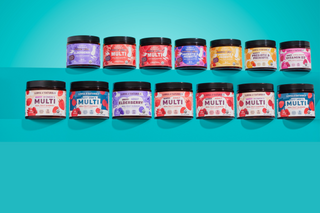
Key Points:
- Chewables often contain higher sugar levels and lower nutrient concentration than non-chewables — but clean alternatives like Llama Naturals exist.
- Chewable vitamins tend to absorb better in the human body than those in capsule and pill forms.
Scanning the aisles in your local health store for the best vitamin supplements can be overwhelming. After all, there are all kinds of vitamins under the sun. Between chewable vitamins vs. pills, it's a lot to take in.
There are also other factors to consider. Like, do gummy vitamins work as well as pills? Is there any difference in the amount of nutrients between chewables and non-chewables? Which type of vitamin supplement does your body best absorb?
If these questions have been plaguing you, you've come to the right place. Ahead, we answer all of your pressing questions about chewable vitamins vs. pills.
Chewable Vitamins vs. Pills
First up, let's talk about the differences between chewable vitamins vs. pills (aka, the non-chewables).
Chewable Vitamins
When we say “chewable vitamins,” tasty-looking supplements in gummy form may come to mind. Some kids even mistake chewables for actual sweets. After all, if it looks like candy and tastes just like it, it must be for dessert, right?
Unlike run-of-the-mill confectionery, chewable vitamins are dietary supplements intended to be chewed, then swallowed. They often take the form of gummies, vitamin tablets, and soft chews. Children and adults who dislike swallowing pills can now take the supplements without water.
Non-Chewable Vitamins
Traditional capsules and pills are non-chewable vitamins. Soft gel capsules — usually liquid-filled with a thin coating of gelatin or pectin — also fall in this category. Because they are designed to be swallowed, they are generally lower in sugar and higher in nutrients than chewable vitamins.
Supplement Ingredients and Nutritional Value
Whether it's meant for chewing or swallowing, there's a supplement for every vitamin out there. From the classic vitamin C to folic acid (vitamin B9) often used by pregnant women, these supplements come in all shapes, sizes, textures, and flavors.
Appearance and taste aside, the ingredients and nutritional value also differ for chewable vitamins vs. pills.
Active Ingredients vs. Non-Actives
The ingredient composition of a vitamin supplement is mainly split into:
- Active ingredients: These ingredients take credit for the supplement's health benefits. For example, vitamin B12 is the active ingredient in a supplement targeted at bone health.
- Non-active ingredients: These ingredients enhance the supplement's stability, shelf life, and taste. Common examples include sugar, flavors, colorings, gelling agents, fillers, and other additives.
Gummy vitamins and other chewables contain a higher concentration of non-active ingredients such as sugars, syrups, gells, acids, sweeteners, colorings, flavors, and other additives compared to pills and capsules. To make room for these non-active ingredients, many chewable vitamins contain a lower amount of nutrients than pills and capsules. That said, non-chewable vitamins may still have fillers and other additives.
Thankfully, this is something you never have to worry about with our supplements, as we use only plant-based ingredients minus the fillers and additives.
Sugar, Sugar, and More Sugar
Chewable vitamins often contain more grams of sugar than pill-form ones. It's the reason your gummy vitamin tastes like candy, after all.
Checking the product label to find out the sugar content can feel a lot like detective work. It can appear in different forms such as sugar, cane sugar and various syrups. Even when supplements are labeled sugar-free, they may still sneak in artificial sweeteners or sugar alcohols (sweet carbs that trigger digestive upset in some people).
Sure, there are tons of sugar-filled chewables on the market that stick to your teeth. Still, clean alternatives exist that pack no added sugars, artificial or otherwise. Case in point: Llama Naturals. One of our mantras is "No added sugar, no sugar highs."
Chewable Vitamins vs. Pills — The Battle of Absorption

When choosing a vitamin supplement, it isn't enough to scrutinize the ingredient list and nutritional composition. How well your body absorbs it matters just as much, if not more.
The Starting Line of Digestion
Chewable vitamins may be more bioavailable than non-chewables. In human-speak, that means your body may better absorb and use chewable vitamins vs. pills.
When you nibble on a gummy vitamin, salivary enzymes in your mouth start to break down the supplement. This process continues in your stomach and small intestine as the supplement moves through your digestive system until it's fully absorbed.
Meanwhile, pills and capsules only undergo digestion once they reach the stomach. Some slow-release formulations may only start breaking down in the small intestine.
In cases of low-quality vitamin capsules and pills, your body may not fully absorb the supplement. A 2020 review from ConsumerLab.com highlighted that multivitamin pills/caplets from two different brands didn’t fully break down, even after 30-60 minutes. This is longer than what the U.S. Pharmacopeia recommends for proper absorption. This is because pills and capsules only begin digestion once they reach the stomach or small intestine.
This is why a 2019 study found that vitamin D3 gummies "had greater bioavailability than tablets" with higher vitamin D concentrations.
The bottom line is, even though pills may contain higher nutrient concentrations than chewables, their poorer bioavailability could mean you don't get all you need out of the supplement.
Natural Trumps Synthetic
In terms of absorption efficiency, naturally derived vitamins seem to do better than man-made ones. Various studies pointed out that the absorption rate of natural vitamin E is roughly two to three times that of the synthetic version. It’s safe to say, (mostly natural) chewables trump (mostly synthetic) non-chewables in this area.
This is because our bodies are designed to absorb nutrients in a holistic package. After consuming an orange, your digestive system absorbs more than just vitamin A and vitamin C. It also absorbs more tha hundreds of phytonutrients and flavinoids.
Synthetic vitamins, like vitamin D, may not give your body the optimal amount of nutrients the same way whole foods — let’s say, shiitake mushrooms — could. Or, a gummy multivitamin made with real shiitake mushrooms. Speaking of shiitake-sourced vitamins, you should totally check out our vitamin D3 supplement.
It can be confusing figuring out which is natural and which is man-made. For example, you may assume chemical-sounding ingredients like ascorbic acid (a scientific term for vitamin C) are lab-created. Yet, what many people don’t know is that ascorbic acid also naturally occurs in whole foods, like organic strawberries.
So, what’s the best way to check if vitamins are au naturel? Simple — look for brands that specifically say their vitamins are extracted from natural sources such as fruits and veggies (cue Llama Naturals). Alternatively, you can drop a brand a friendly email or ring up the customer hotline for the details. If no such confirmation is available, the supplements are likely synthetic as over 90% of vitamins are produced in a lab.
That said, not all synthetic supplement ingredients are bad or inferior — as always, it just depends on the science. Either way, we do believe that you should generally get most of your nutrients from regularly consuming a variety of nutrient dense whole foods, not just supplements.
Shelf Life
You may also want to keep in mind that some chewable vitamins contain a higher level of active ingredients than what's stated on the label. This is done to counteract the short shelf life of chewables, as they absorb moisture faster than pill-form vitamins. As the chewables become less potent, the higher-than-listed concentrations make sure you still get the minimal benefits of its stated nutritional value over time.
Unfortunately, high levels of synthetic vitamins isn’t a good thing. Some reports have linked excessive nutrient intakes to health problems, including an elevated risk for some types of cancer.
This is why we choose to use natural vitamins at Llama Naturals, which have a proprietary plant-based enteric coating that keeps our vitamins stable until they reach your small intestine where they are best absorbed.
Llama Naturals: Tasty Supplements to Support Wellness

As you can see, chewable vitamins vs. pills often differ in a few key areas. Your body typically does a better job in absorbing chewables than the non-chewables. That said, chewable gummies and tablets often contain more sugar than the pill-form types. Keep in mind that these differences also vary at the brand level.
At the end of the day, it also boils down to personal choice. Do you or your kids prefer tasty chewable vitamins or swallowing capsules?
Perhaps you are Team Chewables but want to steer clear of the added sugars and synthetics. If that's the case, look no further than Llama Naturals. Our vitamin supplements are made with whole fruit, no added sugars, plus whole-food vitamins. Shop our store today to find only the best for you and your loved ones.
Llama Naturals is a plant-based nutrition brand that has created the World's First Whole Fruit Gummy Vitamins that are made with no added sugar and whole-food vitamins. They are USDA Organic, Vegan, Gluten Free, free of common allergens, and are slow-cooked on low heat to retain rich phytonutrients & fruit flavor. It’s a win-win gummy vitamin that you and the family will love.

